formerly eScholarship Editions


|
|
|
|
Your request for similar items found 20 book(s). | Modify Search | Displaying 1 - 20 of 20 book(s) | |
| 1. | 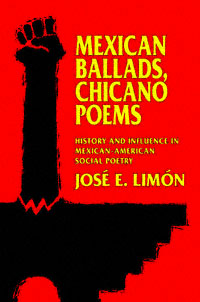 | Title: Mexican ballads, Chicano poems: history and influence in Mexican-American social poetry Author: Limón, José Eduardo Published: University of California Press, 1992 Subjects: Literature | Literary Theory and Criticism | American Literature | American Studies | Latin American History | Folklore and Mythology Publisher's Description: Mexican Ballads, Chicano Poems combines literary theory with the personal engagement of a prominent Chicano scholar. Recalling his experiences as a student in Texas, José Limón examines the politically motivated Chicano poetry of the 60s and 70s. He bases his analyses on Harold Bloom's theories of literary influence but takes Bloom into the socio-political realm. Limón shows how Chicano poetry is nourished by the oral tradition of the Mexican corrido , or master ballad, which was a vital part of artistic and political life along the Mexican-U.S. border from 1890 to 1930.Limón's use of Bloom, as well as of Marxist critics Raymond Williams and Fredric Jameson, brings Chicano literature into the arena of contemporary literary theory. By focusing on an important but little-studied poetic tradition, his book challenges our ideas of the American canon and extends the reach of Hispanists and folklorists as well. [brief] Similar Items |
| 2. | 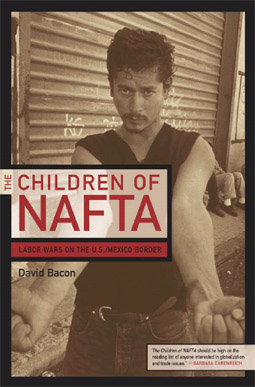 | Title: The children of NAFTA: labor wars on the U.S./Mexico border Author: Bacon, David 1948- Published: University of California Press, 2004 Subjects: Sociology | American Studies | Labor Studies | Ethnic Studies | Latin American Studies | Immigration | Politics | Anthropology Publisher's Description: Food, televisions, computer equipment, plumbing supplies, clothing. Much of the material foundation of our everyday lives is produced along the U.S./Mexico border in a world largely hidden from our view. Based on gripping firsthand accounts, this book investigates the impact of the North American Free Trade Agreement on those who labor in the agricultural fields and maquiladora factories on the border. Journalist David Bacon paints a powerful portrait of poverty, repression, and struggle, offering a devastating critique of NAFTA in the most pointed and in-depth examination of border workers published to date. Unlike journalists who have made brief excursions into strawberry fields and maquiladoras, Bacon has more than a decade's experience reporting on the ground at the border, and he has developed sustained relationships with scores of workers and organizers who have entrusted him with their stories. He describes harsh conditions of child labor in the Mexicali Valley, the deplorable housing outside factories in cities such as Tijuana, and corporate retaliation faced by union organizers. He finds that, despite the promises of its backers, NAFTA has locked in a harsh neoliberal economic policy that has swept away laws and protections that Mexican workers had established over decades. More than a showcase for NAFTA's victims, this book traces the emergence of a new social consciousness, telling how workers in Mexico, the United States, and Canada are now beginning to join together in a powerful new strategy of cross-border organizing as they search for economic and social justice. [brief] Similar Items |
| 3. | 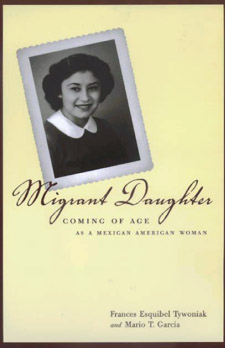 | Title: Migrant daughter: coming of age as a Mexican American woman Author: Tywoniak, Frances Esquibel 1931- Published: University of California Press, 2000 Subjects: Ethnic Studies | Women's Studies | Chicano Studies | California and the West | Californian and Western History | Autobiographies and Biographies Publisher's Description: Taking us from the open spaces of rural New Mexico and the fields of California's Great Central Valley to the intellectual milieu of student life in Berkeley during the 1950s, this memoir, based on an oral history by Mario T. García, is the powerful and moving testimonio of a young Mexican American woman's struggle to rise out of poverty. Migrant Daughter is the coming-of-age story of Frances Esquibel Tywoniak, who was born in Spanish-speaking New Mexico, moved with her family to California during the Depression to attend school and work as a farm laborer, and subsequently won a university scholarship, becoming one of the few Mexican Americans to attend the University of California, Berkeley, at that time. Giving a personal perspective on the conflicts of living in and between cultures, this eloquent story provides a rare glimpse into the life of a young Mexican American woman who achieved her dreams of obtaining a university education. In addition to the many fascinating details of everyday life the narrative provides, Mario T. García's introduction contextualizes the place and importance of Tywoniak's life. Both introduction and narrative illustrate the process by which Tywoniak negotiated her relation to ethnic identity and cultural allegiances, the ways in which she came to find education as a channel for breaking with fieldwork patterns of life, and the effect of migration on family and culture. This deeply personal memoir portrays a courageous Mexican American woman moving between many cultural worlds, a life story that at times parallels, and at times diverges from, the real life experiences of thousands of other, unnamed women. [brief] Similar Items |
| 4. | 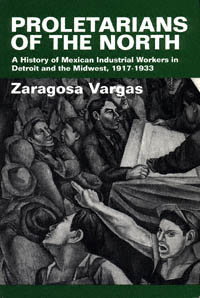 | Title: Proletarians of the North: a history of Mexican industrial workers in Detroit and the Midwest, 1917-1933 Author: Vargas, Zaragosa Published: University of California Press, 1993 Subjects: History | United States History | Latino Studies | Chicano Studies Publisher's Description: Between the end of World War I and the Great Depression, over 58,000 Mexicans journeyed to the Midwest in search of employment. Many found work in agriculture, but thousands more joined the growing ranks of the industrial proletariat. Throughout the northern Midwest, and especially in Detroit, Mexican workers entered steel mills, packing houses, and auto plants, becoming part of the modern American working class.Zaragosa Vargas's work focuses on this little-known feature in the history of Chicanos and American labor. In relating the experiences of Mexicans in workplace and neighborhood, and in showing the roles of Mexican women, the Catholic Church, and labor unions, Vargas enriches our knowledge of immigrant urban life. His is an important work that will be welcomed by historians of Chicano Studies and American labor. [brief] Similar Items |
| 5. | 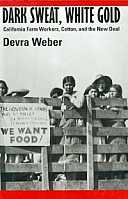 | Title: Dark sweat, white gold: California farm workers, cotton, and the New Deal Author: Weber, Devra 1946- Published: University of California Press, 1994 Subjects: History | Californian and Western History | Latino Studies | Labor Studies | California and the West | African History Publisher's Description: In her incisive analysis of the shaping of California's agricultural work force, Devra Weber shows how the cultural background of Mexican and, later, Anglo-American workers, combined with the structure of capitalist cotton production and New Deal politics, forging a new form of labor relations. She pays particular attention to Mexican field workers and their organized struggles, including the famous strikes of 1933.Weber's perceptive examination of the relationships between economic structure, human agency, and the state, as well as her discussions of the crucial role of women in both Mexican and Anglo working-class life, make her book a valuable contribution to labor, agriculture, Chicano, Mexican, and California history. [brief] Similar Items |
| 6. | 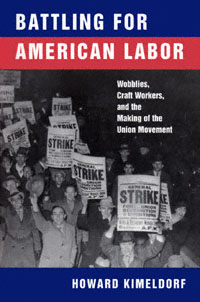 | Title: Battling for American labor: wobblies, craft workers, and the making of the union movement Author: Kimeldorf, Howard Published: University of California Press, 1999 Subjects: American Studies | Sociology | History | United States History | Labor Studies Publisher's Description: In this incisive reinterpretation of the history of the American labor movement, Howard Kimeldorf challenges received thinking about rank-and-file workers and the character of their unions. Battling for American Labor answers the baffling question of how, while mounting some of the most aggressive challenges to employing classes anywhere in the world, organized labor in the United States has warmly embraced the capitalist system of which they are a part. Rejecting conventional understandings of American unionism, Kimeldorf argues that what has long been the hallmark of organized labor in the United States - its distinctive reliance on worker self-organization and direct economic action - can be seen as a particular kind of syndicalism.Kimeldorf brings this syndicalism to life through two rich and compelling case studies of unionization efforts by Philadelphia longshoremen and New York City culinary workers during the opening decades of the twentieth century. He shows how these workers, initially affiliated with the radical IWW and later the conservative AFL, pursued a common logic of collective action at the point of production that largely dictated their choice of unions. Elegantly written and deeply engaging, Battling for American Labor offers insights not only into how the American labor movement got to where it is today, but how it might possibly reinvent itself in the years ahead. [brief] Similar Items |
| 7. | 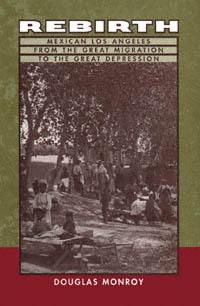 | Title: Rebirth: Mexican Los Angeles from the great migration to the Great Depression Author: Monroy, Douglas Published: University of California Press, 1999 Subjects: History | Latino Studies | United States History | California and the West Publisher's Description: This sweeping, vibrant narrative chronicles the history of the Mexican community in Los Angeles. Douglas Monroy unravels the dramatic, complex story of Mexican immigration to Los Angeles during the early decades of the twentieth century and shows how Mexican immigrants re-created their lives and their communities. Against the backdrop of this newly created cityscape, Rebirth explores pivotal aspects of Mexican Los Angeles during this time - its history, political economy, popular culture - and depicts the creation of a time and place unique in Californian and American history.Mexican boxers, movie stars, politicians, workers, parents, and children, American popular culture and schools, and historical fervor on both sides of the border all come alive in this literary, jargon-free chronicle. In addition to the colorful unfolding of the social and cultural life of Mexican Los Angeles, Monroy tells a story of first-generation immigrants that provides important points of comparison for understanding other immigrant groups in the United States.Monroy shows how the transmigration of space, culture, and reality from Mexico to Los Angeles became neither wholly American nor Mexican, but México de afuera , "Mexico outside," a place where new concerns and new lives emerged from what was both old and familiar. This extremely accessible work uncovers the human stories of a dynamic immigrant population and shows the emergence of a truly transnational history and culture. Rebirth provides an integral piece of Chicano history, as well as an important element of California urban history, with the rich, synthetic portrait it gives of Mexican Los Angeles. [brief] Similar Items |
| 8. | 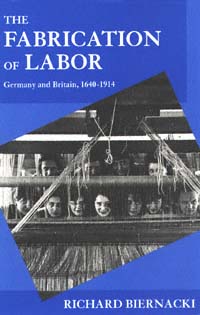 | Title: The fabrication of labor: Germany and Britain, 1640-1914 Author: Biernacki, Richard 1956- Published: University of California Press, 1997 Subjects: History | Sociology | Labor Studies | European History Publisher's Description: This monumental study demonstrates the power of culture to define the meaning of labor. Drawing on massive archival evidence from Britain and Germany, as well as historical evidence from France and Italy, The Fabrication of Labor shows how the very nature of labor as a commodity differed fundamentally in different national contexts. A detailed comparative study of German and British wool textile mills reveals a basic difference in the way labor was understood, even though these industries developed in the same period, used similar machines, and competed in similar markets. These divergent definitions of the essential character of labor as a commodity influenced the entire industrial phenomenon, affecting experiences of industrial work, methods of remuneration, disciplinary techniques, forms of collective action, and even industrial architecture. Starting from a rigorous analysis of detailed archival materials, this study broadens out to analyze the contrasting developmental pathways to wage labor in Western Europe and offers a startling reinterpretation of theories of political economy put forward by Adam Smith and Karl Marx. In his brilliant cross-national study, Richard Biernacki profoundly reorients the analysis of how culture constitutes the very categories of economic life. [brief] Similar Items |
| 9. | 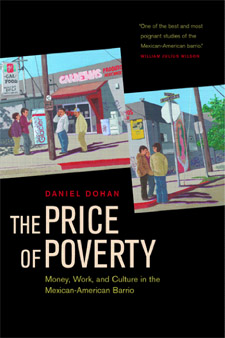 | Title: The price of poverty: money, work, and culture in the Mexican-American barrio Author: Dohan, Daniel 1965- Published: University of California Press, 2003 Subjects: Anthropology | Sociology | Social Problems | Urban Studies | Latin American Studies | Chicano Studies | Labor Studies Publisher's Description: Drawing on two years of ethnographic fieldwork in two impoverished California communities - one made up of recent immigrants from Mexico, the other of U.S.-born Chicano citizens - this book provides an invaluable comparative perspective on Latino poverty in contemporary America. In northern California's high-tech Silicon Valley, author Daniel Dohan shows how recent immigrants get by on low-wage babysitting and dish-cleaning jobs. In the housing projects of Los Angeles, he documents how families and communities of U.S.-born Mexican Americans manage the social and economic dislocations of persistent poverty. Taking readers into worlds where public assistance, street crime, competition for low-wage jobs, and family, pride, and cross-cultural experiences intermingle, The Price of Poverty offers vivid portraits of everyday life in these Mexican American communities while addressing urgent policy questions such as: What accounts for joblessness? How can we make sense of crime in poor communities? Does welfare hurt or help? [brief] Similar Items |
| 10. | 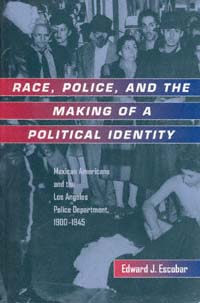 | Title: Race, police, and the making of a political identity: Mexican Americans and the Los Angeles Police Department, 1900-1945 Author: Escobar, Edward J 1946- Published: University of California Press, 1999 Subjects: History | California and the West | Latin American History | Latino Studies | Social Problems | Politics | Californian and Western History | Urban Studies | Criminology | Criminology Publisher's Description: In June 1943, the city of Los Angeles was wrenched apart by the worst rioting it had seen to that point in the twentieth century. Incited by sensational newspaper stories and the growing public hysteria over allegations of widespread Mexican American juvenile crime, scores of American servicemen, joined by civilians and even police officers, roamed the streets of the city in search of young Mexican American men and boys wearing a distinctive style of dress called a Zoot Suit. Once found, the Zoot Suiters were stripped of their clothes, beaten, and left in the street. Over 600 Mexican American youths were arrested. The riots threw a harsh light upon the deteriorating relationship between the Los Angeles Mexican American community and the Los Angeles Police Department in the 1940s.In this study, Edward J. Escobar examines the history of the relationship between the Los Angeles Police Department and the Mexican American community from the turn of the century to the era of the Zoot Suit Riots. Escobar shows the changes in the way police viewed Mexican Americans, increasingly characterizing them as a criminal element, and the corresponding assumption on the part of Mexican Americans that the police were a threat to their community. The broader implications of this relationship are, as Escobar demonstrates, the significance of the role of the police in suppressing labor unrest, the growing connection between ideas about race and criminality, changing public perceptions about Mexican Americans, and the rise of Mexican American political activism. [brief] Similar Items |
| 11. | 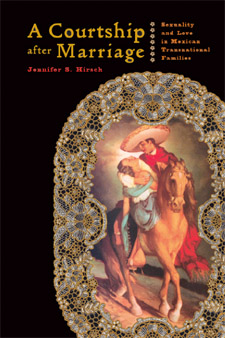 | Title: A courtship after marriage: sexuality and love in Mexican transnational families Author: Hirsch, Jennifer S Published: University of California Press, 2003 Subjects: Anthropology | American Studies | Cultural Anthropology | Latino Studies | Chicano Studies | Sociology | Gender Studies | Latin American Studies | Immigration | Sociology Publisher's Description: From about seven children per woman in 1960, the fertility rate in Mexico has dropped to about 2.6. Such changes are part of a larger transformation explored in this book, a richly detailed ethnographic study of generational and migration-related redefinitions of gender, marriage, and sexuality in r . . . [more] Similar Items |
| 12. | 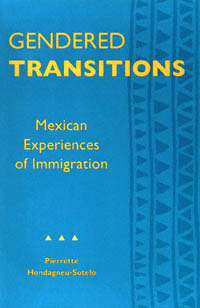 | Title: Gendered transitions: Mexican experiences of immigration Author: Hondagneu-Sotelo, Pierrette Published: University of California Press, 1994 Subjects: Sociology | Latin American Studies | Gender Studies | Chicano Studies | Women's Studies Publisher's Description: The momentous influx of Mexican undocumented workers into the United States over the last decades has spurred new ways of thinking about immigration. Pierrette Hondagneu-Sotelo's incisive book enlarges our understanding of these recently arrived Americans and uncovers the myriad ways that women and men recreate families and community institutions in a new land.Hondagneu-Sotelo argues that people do not migrate as a result of concerted household strategies, but as a consequence of negotiations often fraught with conflict in families and social networks. Migration and settlement transform long-held ideals and lifestyles. Traditional patterns are reevaluated, and new relationships - often more egalitarian - emerge. Women gain greater personal autonomy and independence as they participate in public life and gain access to both social and economic influence previously beyond their reach.Bringing to life the experiences of undocumented immigrants and delineating the key role of women in newly established communities, Gendered Transitions challenges conventional assumptions about gender and migration. It will be essential reading for demographers, historians, sociologists, and policymakers."I've opened my eyes. Back there, they say 'no.' You marry, and no, you must stay home. Here, it's different. You marry, and you continue working. Back in Mexico, it's very different. There is very much machismo in those men." - A Mexican woman living in the United States [brief] Similar Items |
| 13. | 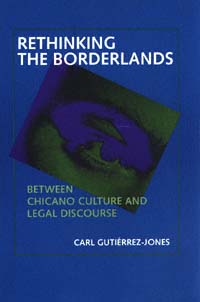 | Title: Rethinking the borderlands: between Chicano culture and legal discourse Author: Gutiérrez-Jones, Carl Scott Published: University of California Press, 1995 Subjects: American Studies | Chicano Studies | Literature | Language and Linguistics | Law | Social and Political Thought | Rhetoric | Postcolonial Studies | United States History | United States History Publisher's Description: Challenging the long-cherished notion of legal objectivity in the United States, Carl Gutiérrez-Jones argues that Chicano history has been consistently shaped by racially biased, combative legal interactions. Rethinking the Borderlands is an insightful and provocative exploration of the ways Chicano and Chicana artists, writers, musicians, and filmmakers engage this history in order to resist the disenfranchising effects of legal institutions, including the prison and the court.Gutiérrez-Jones examines the process by which Chicanos have become associated with criminality in both our legal institutions and our mainstream popular culture and thereby offers a new way of understanding minority social experience. Drawing on gender studies and psychoanalysis, as well as critical legal and race studies, Gutiérrez-Jones's approach to the law and legal discourse reveals the high stakes involved when concepts of social justice are fought out in the home, in the workplace and in the streets. [brief] Similar Items |
| 14. | 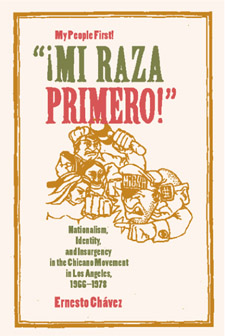 | Title: "Mi raza primero!" (My people first!): nationalism, identity, and insurgency in the Chicano movement in Los Angeles, 1966-1978 Author: Chávez, Ernesto 1962- Published: University of California Press, 2002 Subjects: History | California and the West | Californian and Western History | Chicano Studies | Sociology | Politics | Social Problems | Immigration Publisher's Description: ¡Mi Raza Primero! is the first book to examine the Chicano movement's development in one locale - in this case Los Angeles, home of the largest population of people of Mexican descent outside of Mexico City. Ernesto Chávez focuses on four organizations that constituted the heart of the movement: The Brown Berets, the Chicano Moratorium Committee, La Raza Unida Party, and the Centro de Acción Social Autónomo, commonly known as CASA. Chávez examines and chronicles the ideas and tactics of the insurgency's leaders and their followers who, while differing in their goals and tactics, nonetheless came together as Chicanos and reformers. Deftly combining personal recollection and interviews of movement participants with an array of archival, newspaper, and secondary sources, Chávez provides an absorbing account of the events that constituted the Los Angeles-based Chicano movement. At the same time he offers insights into the emergence and the fate of the movement elsewhere. He presents a critical analysis of the concept of Chicano nationalism, an idea shared by all leaders of the insurgency, and places it within a larger global and comparative framework. Examining such variables as gender, class, age, and power relationships, this book offers a sophisticated consideration of how ethnic nationalism and identity functioned in the United States during the 1960s and 1970s. [brief] Similar Items |
| 15. | 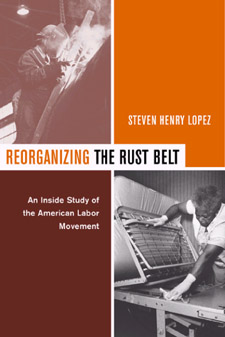 | Title: Reorganizing the Rust Belt: an inside study of the American labor movement Author: Lopez, Steven Henry 1968- Published: University of California Press, 2004 Subjects: Sociology | Economics and Business | Labor Studies | Public Policy | Anthropology | Urban Studies | Urban Studies Publisher's Description: This gripping insider's look at the contemporary American trade union movement shows that reports of organized labor's death are premature. In this eloquent and erudite narrative, Steven Henry Lopez demonstrates how, despite a hostile legal environment and the punitive anti-unionism of U.S. employers, a few unions have organized hundreds of thousands of low-wage service workers in the past few years. The Service Employees International Union (SEIU) has been at the forefront of this effort, in the process pioneering innovative strategies of grassroots mobilization and protest. In a powerful ethnography that captures the voices of those involved in SEIU nursing-home organizing in western Pennsylvania, Lopez illustrates how post-industrial, low-wage workers are providing the backbone for a reinvigorated labor movement across the country. Reorganizing the Rust Belt argues that the key to the success of social movement unionism lies in its ability to confront a series of dilemmas rooted in the history of American labor relations. Lopez shows how the union's ability to devise creative solutions - rather than the adoption of specific tactics - makes the difference between success and failure. [brief] Similar Items |
| 16. | 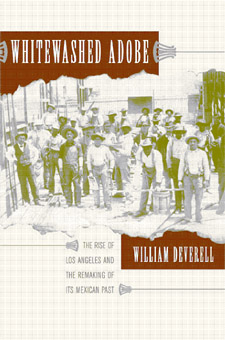 | Title: Whitewashed adobe: the rise of Los Angeles and the remaking of its Mexican past Author: Deverell, William Francis Published: University of California Press, 2004 Subjects: History | Californian and Western History | Chicano Studies | American Studies | Urban Studies Publisher's Description: Chronicling the rise of Los Angeles through shifting ideas of race and ethnicity, William Deverell offers a unique perspective on how the city grew and changed. Whitewashed Adobe considers six different developments in the history of the city - including the cementing of the Los Angeles River, the outbreak of bubonic plague in 1924, and the evolution of America's largest brickyard in the 1920s. In an absorbing narrative supported by a number of previously unpublished period photographs, Deverell shows how a city that was once part of Mexico itself came of age through appropriating - and even obliterating - the region's connections to Mexican places and people. Deverell portrays Los Angeles during the 1850s as a city seething with racial enmity due to the recent war with Mexico. He explains how, within a generation, the city's business interests, looking for a commercially viable way to establish urban identity, borrowed Mexican cultural traditions and put on a carnival called La Fiesta de Los Angeles. He analyzes the subtle ways in which ethnicity came to bear on efforts to corral the unpredictable Los Angeles River and shows how the resident Mexican population was put to work fashioning the modern metropolis. He discusses how Los Angeles responded to the nation's last major outbreak of bubonic plague and concludes by considering the Mission Play, a famed drama tied to regional assumptions about history, progress, and ethnicity. Taking all of these elements into consideration, Whitewashed Adobe uncovers an urban identity - and the power structure that fostered it - with far-reaching implications for contemporary Los Angeles. [brief] Similar Items |
| 17. | 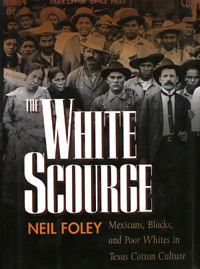 | Title: The white scourge: Mexicans, Blacks, and poor whites in Texas cotton culture Author: Foley, Neil Published: University of California Press, 1998 Subjects: History | Ethnic Studies | American Studies Publisher's Description: In a book that fundamentally challenges our understanding of race in the United States, Neil Foley unravels the complex history of ethnicity in the cotton culture of central Texas. This engrossing narrative, spanning the period from the Civil War through the collapse of tenant farming in the early 1940s, bridges the intellectual chasm between African American and Southern history on one hand and Chicano and Southwestern history on the other. The White Scourge describes a unique borderlands region, where the cultures of the South, West, and Mexico overlap, to provide a deeper understanding of the process of identity formation and to challenge the binary opposition between "black" and "white" that often dominates discussions of American race relations.In Texas, which by 1890 had become the nation's leading cotton-producing state, the presence of Mexican sharecroppers and farm workers complicated the black-white dyad that shaped rural labor relations in the South. With the transformation of agrarian society into corporate agribusiness, white racial identity began to fracture along class lines, further complicating categories of identity. Foley explores the "fringe of whiteness," an ethno-racial borderlands comprising Mexicans, African Americans, and poor whites, to trace shifting ideologies and power relations. By showing how many different ethnic groups are defined in relation to "whiteness," Foley redefines white racial identity as not simply a pinnacle of status but the complex racial, social, and economic matrix in which power and privilege are shared.Foley skillfully weaves archival material with oral history interviews, providing a richly detailed view of everyday life in the Texas cotton culture. Addressing the ways in which historical categories affect the lives of ordinary people, The White Scourge tells the broader story of racial identity in America; at the same time it paints an evocative picture of a unique American region. This truly multiracial narrative touches on many issues central to our understanding of American history: labor and the role of unions, gender roles and their relation to ethnicity, the demise of agrarian whiteness, and the Mexican-American experience. [brief] Similar Items |
| 18. | 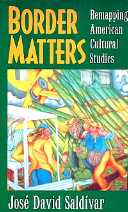 | Title: Border matters: remapping American cultural studies Author: Saldívar, José David Published: University of California Press, 1997 Subjects: Ethnic Studies | Popular Culture | Literature Publisher's Description: Border Matters locates the study of Chicano culture in a broad social context. José Saldívar examines issues of representation and expression in a diverse, exciting assortment of texts - corridos , novels, poems, short stories, punk and hip-hop music, ethnography, paintings, performance, art, and essays. Saldívar provides a sophisticated model for a new kind of U.S. cultural studies, one that challenges the homogeneity of U.S. nationalism and popular culture by foregrounding the contemporary experiences and historical circumstances facing Chicanos and Chicanas.This intellectually adventurous, politically engaged study applies borderlands and diaspora theory to Chicano cultural practices in a way that permanently changes our understanding of both the Chicano experience and the meaning of cultural theory. Defying national (and nationalistic) paradigms of culture, Saldívar argues that the culture of the borderlands is trans-national, constituting a social space in which new relations, hybrid cultures, and multi-voiced aesthetics are negotiated.Saldívar's critical readings treat culture as a social force and reveal the presence of social contexts within cultural texts. Border Matters maps out a new terrain for the study of culture, reshaping the way we understand migration, national identity, and intellectual inquiry itself. [brief] Similar Items |
| 19. | 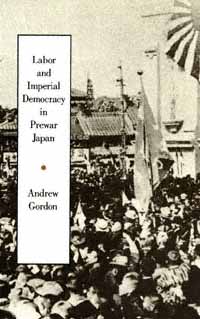 | Title: Labor and imperial democracy in prewar Japan Author: Gordon, Andrew 1952- Published: University of California Press, 1991 Subjects: Asian Studies | Japan | Politics | Asian History | Labor Studies Publisher's Description: Labor and Imperial Democracy in Prewar Japan examines the political role played by working men and women in prewar Tokyo and offers a reinterpretation of the broader dynamics of Japan's prewar political history. Gordon argues that such phenomena as riots, labor disputes, and union organizing can best be understood as part of an early twentieth-century movement for "imperial democracy" shaped by the nineteenth-century drive to promote capitalism and build a modern nation and empire. When the propertied, educated leaders of this movement gained a share of power in the 1920s, they disagreed on how far to go toward incorporating working men and women into an expanded body politic. For their part, workers became ambivalent toward working within the imperial democratic system. In this context, the intense polarization of laborers and owners during the Depression helped ultimately to destroy the legitimacy of imperial democracy.Gordon suggests that the thought and behavior of Japanese workers both reflected and furthered the intense concern with popular participation and national power that has marked Japan's modern history. He points to a post-World War II legacy for imperial democracy in both the organization of the working class movement and the popular willingness to see GNP growth as an index of national glory. Importantly, Gordon shows how historians might reconsider the roles of tenant farmers, students, and female activists, for example, in the rise and transformation of imperial democracy. [brief] Similar Items |
| 20. | 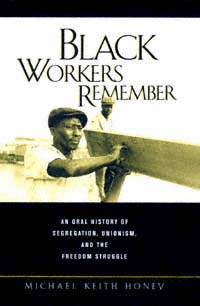 | Title: Black workers remember: an oral history of segregation, unionism, and the freedom struggle Author: Honey, Michael K Published: University of California Press, 2000 Subjects: History | United States History | Labor Studies | African American Studies Publisher's Description: The labor of black workers has been crucial to economic development in the United States. Yet because of racism and segregation, their contribution remains largely unknown. Spanning the 1930s to the present, Black Workers Remember tells the hidden history of African American workers in their own words. It provides striking firsthand accounts of the experiences of black southerners living under segregation in Memphis, Tennessee. Eloquent and personal, these oral histories comprise a unique primary source and provide a new way of understanding the black labor experience during the industrial era. Together, the stories demonstrate how black workers resisted racial apartheid in American industry and underscore the active role of black working people in history.The individual stories are arranged thematically in chapters on labor organizing, Jim Crow in the workplace, police brutality, white union racism, and civil rights struggles. Taken together, the stories ask us to rethink the conventional understanding of the civil rights movement as one led by young people and preachers in the 1950s and 1960s. Instead, we see the freedom struggle as the product of generations of people, including workers who organized unions, resisted Jim Crow at work, and built up their families, churches, and communities. The collection also reveals the devastating impact that a globalizing capitalist economy has had on black communities and the importance of organizing the labor movement as an antidote to poverty.QQ Michael Honey gathered these oral histories for more than fifteen years. He weaves them together here into a rich collection reflecting many tragic dimensions of America's racial history while drawing new attention to the role of workers and poor people in African American and American history. [brief] Similar Items |